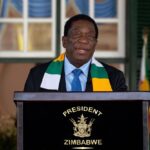Harare – Sungura musician Mark Ngwazi is facing scrutiny following a controversial split with Obert Mangani, widely known as Father Ten Years, the guitarist and arranger credited with playing a pivotal role in Ngwazi’s rise to prominence.
While Ngwazi has enjoyed increasing success in recent years, Father Ten Years has largely remained in the background, content to contribute his musical talents without seeking the limelight. However, the circumstances surrounding their recent separation have brought Father Ten Years’ contributions, and Ngwazi’s actions, into sharp focus.
Obert Mangani, a rural native of Centenary, developed his musical talent from a young age, receiving guidance from his uncle Makesure and Tsaona Katsande, brother of fellow musician Paradzai Mesi. The moniker “Father Ten Years” stems from a childhood prophecy foretelling his breakthrough in the music industry. His first recording opportunity came in 2007, showcasing his versatility by playing all guitar parts on a project after disciplinary issues sidelined other musicians.
Father Ten Years’ journey led him to Harare in 2011, where he collaborated with Obvious Mutani, gaining valuable experience and opportunities to record with artists such as Joseph Garakara and Albert Gatsi. He connected with Mark Ngwazi around 2015, initially joining his band for live performances due to the unreliability of Ngwazi’s bass player.
The collaboration deepened in 2020 when Ngwazi enlisted Father Ten Years for his album “Chamugwegwedu Chamatindike.” Father Ten Years played multiple guitar parts, including bass on the hit song “Taurai Madzoka,” widely considered Ngwazi’s breakthrough track. He subsequently became a full-time member of the band, contributing significantly to subsequent albums, including playing bass and lead guitar on “Nyaradzo yaBaba” and all guitar parts on the hit song “Dzimwe Hondo” from the album “Huzukwende.”
Despite his crucial role in shaping Ngwazi’s signature sound, Father Ten Years’ departure from the band was abrupt and unexplained. He recounts being dismissed from the stage during a sound check at the Tin Mac Concert in Wedza in December last year. Attempts to seek clarification from Ngwazi were unsuccessful, and he was ultimately informed that his services were no longer required.
Adding to the controversy, Father Ten Years alleges that the band continued to use his guitars even after his “suspension.” While awaiting official communication, he learned of his dismissal through social media announcements made by Ngwazi. Although Ngwazi later contacted him about rejoining the band, Father Ten Years refused without a clear explanation for his initial dismissal, feeling exploited and undervalued.
Beyond the circumstances of his departure, Father Ten Years claims he is owed substantial sums for his contributions to Ngwazi’s recordings. He alleges he never received full payment for his work on “Chamugwegwedu Chamatindike,” and received no payment for “Nyaradzo yaBaba,” aside from a trip to the UK. For the latest album, he requested US$600 but received only small payments via EcoCash.
Further complicating matters, Father Ten Years reveals he was appointed as Ngwazi’s manager in 2021 without prior consultation. However, he describes the position as largely symbolic, lacking real authority. He felt primarily responsible for show organisation and unfairly blamed for problems. Ngwazi eventually hired another manager, leaving Father Ten Years feeling marginalized.
Regarding the reasons for his dismissal, Father Ten Years suspects it was motivated by a desire to make way for another manager, mirroring his own appointment. He also believes his vocal stance on financial transparency played a role. As manager, he questioned instances where the band was told there was no money after shows, only to discover promoters had paid in full. He suggested handling financial matters himself, as he faced pressure from band members.
The split between Father Ten Years and Mark Ngwazi represents a significant turning point in Ngwazi’s career. As Father Ten Years steps into the spotlight, his story highlights the often-unrecognized contributions of musicians working behind the scenes to shape Zimbabwean music. The controversy surrounding his departure raises questions about fair compensation and treatment of musicians within the industry.












